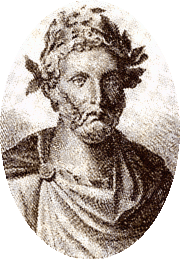Georg Goetz (3 November 1849 in Gompertshausen – 1 January 1932 in Jena) was a German classical philologist, known for his scholarly treatment of Plautus and Varro.

Gompertshausen is a village and a former municipality in the region Heldburger Land in the district of Hildburghausen, in Thuringia, Germany. Since 1 January 2019, it is part of the town Heldburg.

Jena is a German university city and the second largest city in Thuringia. Together with the nearby cities of Erfurt and Weimar, it forms the central metropolitan area of Thuringia with approximately 500,000 inhabitants, while the city itself has a population of about 110,000. Jena is a centre of education and research; the Friedrich Schiller University was founded in 1558 and had 18,000 students in 2017 and the Ernst-Abbe-Fachhochschule Jena counts another 5,000 students. Furthermore, there are many institutes of the leading German research societies.

Titus Maccius Plautus, commonly known as Plautus, was a Roman playwright of the Old Latin period. His comedies are the earliest Latin literary works to have survived in their entirety. He wrote Palliata comoedia, the genre devised by the innovator of Latin literature, Livius Andronicus. The word Plautine refers to both Plautus's own works and works similar to or influenced by his.
From 1870 to 1873 he studied at the University of Leipzig, where his influences included Friedrich Ritschl. In 1873 he received his doctorate with the dissertation De temporibus Ecclesiazuson Aristophanis, and following graduation, worked as a tutor in St. Petersburg. In 1877 he obtained his habilitation for classical philology at Leipzig, and two years later, became an associate professor at the University of Jena. From 1880 to 1924 he was a full professor of classical philology at Jena, serving as university rector on three separate occasions (1890/91, 1902 and 1910/11). [1]
Habilitation defines the qualification to conduct self-contained university teaching and is the key for access to a professorship in many European countries. Despite all changes implemented in the European higher education systems during the Bologna Process, it is the highest qualification level issued through the process of a university examination and remains a core concept of scientific careers in these countries.

Friedrich Schiller University Jena is a public research university located in Jena, Thuringia, Germany.

A rector is a senior official in an educational institution, and can refer to an official in either a university or a secondary school. Outside the English-speaking world the rector is often the most senior official in a university, whilst in the United States the most senior official is often referred to as President and in the United Kingdom and Commonwealth of Nations the most senior official is the Chancellor, whose office is primarily ceremonial and titular. The term and office of a rector can be referred to as a rectorate. The title is used widely in universities in Europe. and is very common in Latin American countries. It is also used in Brunei, Turkey, Russia, Pakistan, the Philippines, Indonesia, Israel and the Middle East. In the ancient universities of Scotland the office is sometimes referred to as Lord Rector, is the third most senior official, and is usually responsible for chairing the University Court.




















